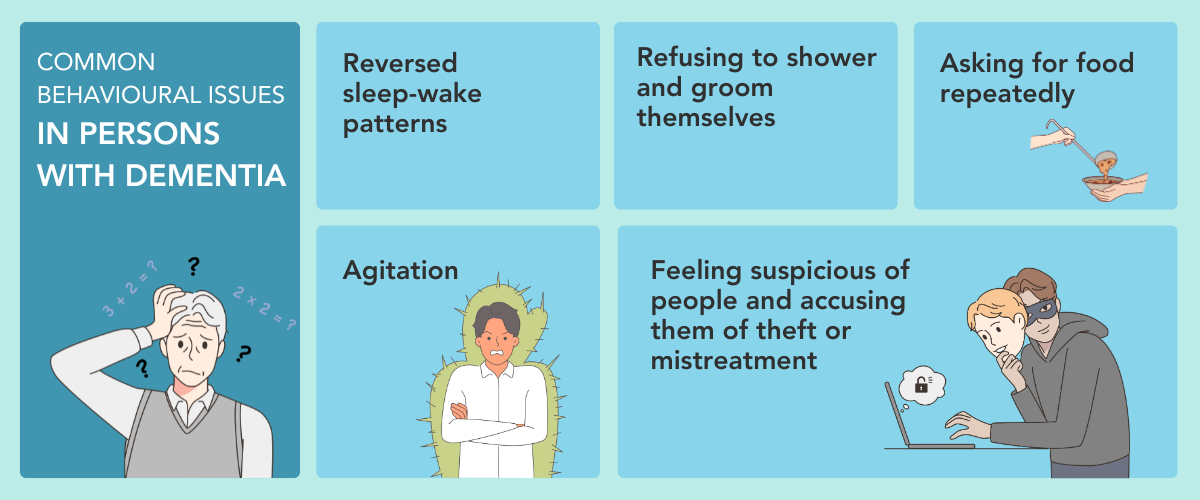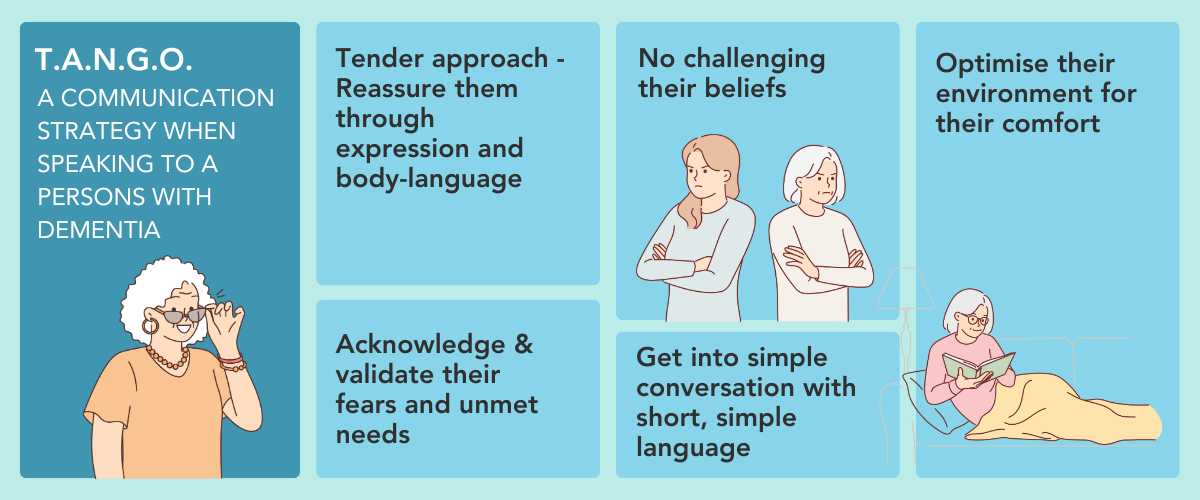Dementia is a term for degenerative brain diseases that affect memory, thinking and the ability to manage daily activities. Many people believe dementia is mostly about memory loss. However, it can also cause changes in behaviour, like restlessness and agitation.
When a loved one with dementia shows "problematic" or "difficult" behaviour, it is often not out of choice. Instead, it is their way of trying to communicate needs that they cannot express clearly. "What we see as a behavioural problem is actually an attempt to communicate their unmet needs with their remaining cognitive abilities," explained Dr Yao Fengyuan, Senior Consultant and Chief of the Department of Geriatric Psychiatry at IMH.
Dr Yao and his team at IMH identified five common behavioural issues that caregivers often struggle with:
- Reversing sleep-wake patterns such as staying awake at night and feeling sleepy in the day
- Refusing to shower and groom themselves
- Repeatedly asking for food and insisting they are hungry although they have just eaten
- Growing suspicious of people around them and accusing them of things such as theft and mistreatment
- Becoming agitated due to discomfort
These behaviours are often linked to changes in the brain. For example, your loved one may have memory loss and cannot remember that they just had a meal, and repeatedly ask for food. They may also have difficulty choosing what to eat as it can be challenging to find the right words when ordering dishes. This is due to cognitive decline in the region of the brain that processes language.

Language mix-ups are also common. They might use the wrong word that starts with the same letter. For example, they could say "floor" instead of "flower". They may also give roundabout descriptions for every items. For instance, they might describe a clock as the "thing on the wall with numbers". When they cannot find the right words, frustration builds, which affects their confidence and mood.
Knowing that these behaviours steam from dementia can help caregivers be more patient and understanding.
While dementia cannot be cured, there are ways to help maintain your loved one's abilities for as long as possible. "It's never too late to try and make things better. Even small, consistent efforts can improve engagement and relationships," said Dr Yao.
Here are some tips to slow down the progression of dementia in a loved one:
- Get diagnosed early as it gives your loved ones access to treatment, including medication that may help slow the progression of dementia. At the same time, families can also get professional support to plan care and make informed decisions.
- Enable them to lead a healthy lifestyle and help them manage chronic conditions like diabetes or high blood pressure. Make sure they keep up with medical appointments.
- Stay socially active and engaged by encouraging familiar hobbies. Adjust activities according to the person's interest and cognitive abilities. Attending a daycare centre with a programme that is tailored for persons with dementia also provides stimulation and social interaction.
- Treat sensory impairments like cataracts and support the use of hearing aids where possible. This helps improve communication and reduce frustration.
Madam Ong, caregiver and wife of her husband with dementia, quit her job of over 40 years to care for him. Watch this video to find out more about her journey.
Avoid these common pitfalls when speaking to a person with dementia:
- Expecting them to recall something they forgot, which only frustrates or embarrasses patients with poor memory
- Talking down or interrupting them as if they were children
- Arguing over facts such as "No one stole your wallet!"
- Using complicated language which is difficult for a person with dementia to understand
Instead, Dr Yao recommends using the T.A.N.G.O. approach, a communication strategy developed by IMH clinicians:
- Tender approach: Be patient, supportive and reassuring through expression and body language
- Acknowledge: Validate their emotions and unmet needs instead of dismissing them.
- No challenging: Avoid aruging with them about facts. Listen and orientate the person using gentle cues and prompts about the current date, time and location.
- Get into simple conversation: Use short and simple sentences, familiar phrases, and provide clear choices.
- Optimise environment: Adapt surroundings to help the person be meaningfully engaged, remain comfortable and independent. For example, put large colourful reminders in familiar spots at home to help them stay connected to the present.
For extra support, caregivers can download Play2Care, a free app create by IMH, to practise T.A.N.G.O. strategies through interactive gameplay about the caregiving experience.

There is no cure for dementia right now. Experts say that getting help early can slow the disease and improve quality of life. An early diagnosis means that caregivers can learn strategies to communicate effectively and reduce behaviour-related stress.
"Seeing a doctor for a diagnosis allows families to understand the cause of cognitive impairment and prepare for care as cognition declines. Ideally, this should be done early," said Dr Yao.
With that, family members can also plan legal and financial matters with peace of mind. They can create a Lasting Power of Attorney (LPA) while the person can still think clearly. This lets the donee make decisions about the patient's care as dementia worsens and mental capacity decreases.
Getting ready early helps families feel calm. They can focus on care instead of rushing to make choices after a diagnosis.
With the support of their family and caregivers, people living with dementia can still enjoy quality of life, remain comfortable and engaged in activities, said Dr Yao.
Focus on finding activities that are practical, easy to do and enjoyable. Remember the goal is to create opportunities for your loved one to feel connected and engaged.
Some activities include reminiscing about a happy memory while looking at old photos. You can also discuss current affairs. This can happen even if they repeat the conversations or if they are not completely accurate. What matters most is the joy and sense of connection the moment brings.
Allow your loved one with dementia to do what they're interested in, such as playing mahjong or card games, at their own pace. Don't worry if they make mistakes as participation and enjoyment are what matters.
Caregivers who understand dementia behaviours and learn communication strategies will improve their relationships with their loved ones and cope better with caregiving, explains Dr Yao.
But one cannot pour from an empty cup. Make sure you meet your own physical, emotional and psychological needs throughout the caregiving role. Some ways to do this include:
- Eating well and resting enough
- Sharing responsibilities with family and friends, or engaging respite services
- Joining caregiver support groups for practical advice and emotional support
- Setting aside time for personal hobbies and activities you enjoy
- Recognising that you cannot always prevent something unexpected from happening
- Limit the number of things you manage as you don't have to be the only one responsible
- Have regular family sessions to update each other on your loved one's progress and needs
- Share your feelings with a trusted loved one
"Learning how to communicate with persons living with dementia is crucial for managing behavioural problems," said Dr Yao. "With the right strategies, families can reduce reliance on medication, prevent burnout and give their loved ones meaningful quality of life."

IMH: Memory Clinic Brochure
Agency For Integrated Care: Learning about dementia care from others
Agency For Integrated Care: Mental health e-Learning modules